2020 Oscar Animated Shorts: Catharsis In Animated Relationships
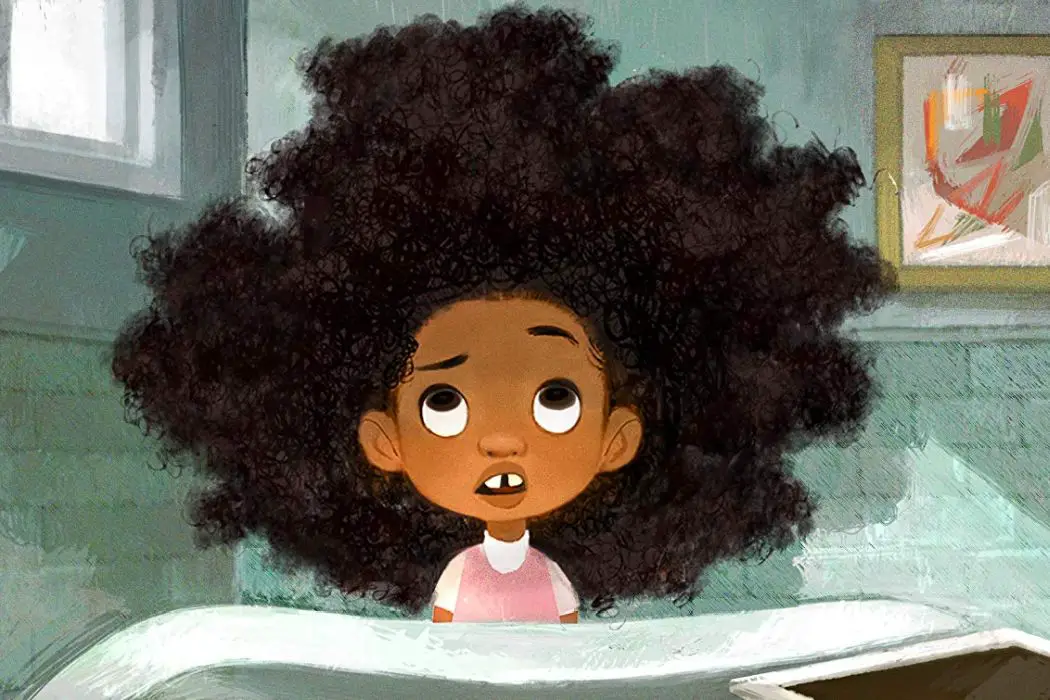
Stephanie Archer is 39 year old film fanatic living in…
With the announcement of the 2020 Oscar nominations comes a hustle to see as many nominated films as possible before the winners are announced. As the years have progressed, so to has the access of these nominated films to audiences. Netflix, Amazon and short film showcases have allowed vast audiences to have the chance to experience the climax of award season to the fullest.
While the shorts programs have the unique ability of rapidly reaching into the depths of audience emotions, this year’s animated short films brought a new light to the extremes of catharsis the medium can provide. The animated shorts focused heavily on the ideas and concepts of relationships, or lack thereof, each with their own unique angle.
While some of the most depressing animated shorts I have ever seen, these are definitely not ones to be missed. If you have the opportunity to see these – make it a priority. They are an experience and a journey all their own.
Daughter (Daria Kashcheeva)

There is such a complexity to father-daughter relationships, a relationship that takes on many forms, shapes and continually finds room for alteration. There is no cookie cutter stamp out on what it should be or how one should interact, but rather an understanding that each is different. Yet, as this relationship continually finds its representation on screen, each difference finds an understanding in many.
Daughter, from writer and director Daria Kashcheeva, was a hard film to watch, sadness still creeping along the edges of my mind as I think back to the carefully paced and caressed depiction of the fragile relationship between parents and their children. There is so much children do not understand, their early memories and thoughts shaping what they view as they grow older. On the flip side, there is also a lot that is not communicated by adults, their thoughts, desires and feelings buried deep, the ability to communicate lost at times through the passing of time.
What starts with a young daughter overlooking the frail body of her father, a bird crashing through a window pulls the young girl and viewers to the past, giving the frail man a parallelism to the frail relationship of him and his daughter. As a young girl returns home with a dead bird she found along the way, she turns to her father for comfort. With visual subtly, viewers will come to understand that the the relationship is one whose strain is far from new, the young girl expecting her father to give the attention she is craving while the father unable to communicate, distracted and pulled away from meeting her needs. As she runs away to her imaginary safe haven, all she truly wants is for her father to come to her – all she really wants is to be noticed, to be hugged.
As time passes, so too does their time together, the father yearning for the ability to connect, to break past his restraints, the young girl eager to escape the emotionless life she has found herself in. While the young girl does not truly understand the depths of her fathers love and devotion to her, viewers are given a true glimpse. While connecting may have been difficult, love was never in shortage.
As the short maintains the spotlight on the relationship of the father and daughter, it also allows grief and regret to linger in the background. Regret haunts us all, especially both the characters on screen. The father regrets his lack of ability to connect, and the daughter regrets where their relationship ended. Yet, while regret weighs heavily on the celluloid capturing it, grief weighs down even more.
There is a grief in the regrets that we can’t make right, that we cannot correct. Yet, grief has another way of rearing itself into the film. While this interpretation may be reserved for this critic alone, as the daughter brings the dead bird to her father, it seems the bird represents something more, something deeper – the loss of a parent, a wife, a mother. There seems to be a deeper meaning in the inability to connect and to understand, in the need for connection.
Daughter gives viewers a moment to witness the handling and understanding of grief as well as our inability to console when we too are grieving. We want to be what our children need, but sometimes we can’t be what they need when we can barely keep ourselves together. While both parties are grieving neither is able to obtain what they need to heal, nor are they able to provide support and strength for one another.
With a layering that will leave much to think about, Daughter is a short that will cut through any heart of any age.
Hair Love (Matthew A. Cherry)
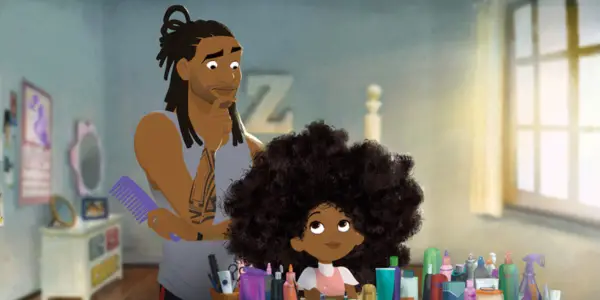
Bringing diversity to the forefront of the animated shorts, it is not diversity that Hair Love revolves around. Instead, Hair Love elects storytelling everyone can relate to. Diversity in cinema does not mean we should lend ourselves to stereotypical representations and call it inclusive, and thankfully Hair Love is the short film that proves why we need and deserve diversity – why stories can be told and understand by the masses beyond predominantly white representation.
Hair Love, produced, written and directed by Matthew A. Cherry, opens to a young girl, eager to wake and greet the day. While viewers are not invited to know why the day is particularly special, the young girl’s excitement will sweep them along with the journey. With a smile and determination, the young girl pulls up what appears to be her favorite blogging site with instructional videos on a variety of hair styles. While she tries to recreate her favorite, her efforts are futile.
As she reluctantly begins to give up, her father arrives, her wholehearted attempt and desperation to succeed inspiring him to the undertaking. While he finds the effort more complicated than originally thought, his determination to bring his daughters desires to fruition push him forward. And not a moment to soon.
As viewers come to understand, the young girl’s emulation of her favorite blogger is instead of her mother, the subject in each of the instructional videos. Today her hair had to be perfect, had to be right as she and her father are finally bringing her mother home from the hospital having undergone treatment for cancer. In a tear jerking revelation, viewers will find a short that started off with something seemingly trivial, a desire of a young child that meant more than one could have ever imagined. The strength of a parents relationship with their child is revealed to be one of the strongest ties within families, love the thread that ties them together, even in the most challenge in moments.
The end credits are the creme de la crime of the short, a heart lifting ending to round out the film. As the three embark on a continued journey together of hair, family and unity, the credits reveal a life after, giving further layers to the emotional reach of Hair Love. Where shorts typically have a constrained reach in their storytelling, Hair Love proves the final moments are never truly the end of the story.
Kitbull (Rosana Sullivan)
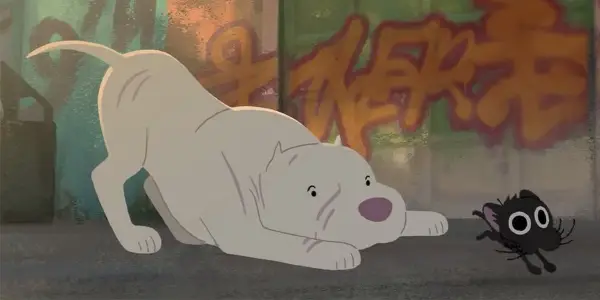
Animal relationships are far from new and one of the most successful ones to depict on screen – just look at the various success of Disney throughout the years. Many of the most successful cinematic friendships are those between the most unlikely of friends. Thumper and Bambi, The Fox and the Hound, an ogre and a donkey – and now a fighting dog and a street alley cat. And with art imitating life, Kitbull couldn’t have come a moment to soon.
Kitbull, written and directed by Rosana Sullivan, will welcome viewers, its seemingly simple animated cat frolicking on screen, mesmerizing with the incredible nuanced detail in his behaviors. There is a spunk and a carefree nature to the feral creature, yet a gentle and domestic essence as well. Yet, as the little cat draws you in, nestling comfortably within its home, viewers will find themselves wanting to pull away as humans invade his territory, bringing a canine along with them. You are fearful for the cat, instantly unsure what this means for his way of life. Yet, concern quickly shifts as a metal chain is brought to the dog, attaching him to a poorly built shelter. I found myself horrified by the implications of this move, my assumptions confirmed shortly after. A fighting dog has been brought into the cat’s home.
Yet, as one would expect a violent animal trained to fight, and even kill, instead viewers are presented with a sweet and agile dog whose curiosity far outweighs even the tiniest sliver of aggression. From this moment, Kitbull begins the journey of two eventual friends, each matching the others curiosity, each wanting but not yet willing to make the final step to friendship. As the dog is thrust outside after a fight, the aggression slowly changing his demeanor, the cat takes the first step, cleaning his wounds and offering comfort. In this moment, an unbeatable bond is forged, viewers no longer fearful for the fate of each individually, but rather together.
Kitbull may surround itself with some of the most disheartening behaviors towards animals, yet it gives hope and enlightenment to the power of friendship – to the power of taking a chance. It is important to remember in the face of the world’s greatest evils, your are never alone, and if you allow it, there will always be someone there to support you; to lick your wounds and provide you comfort.
Mémorable (Bruno Collet)
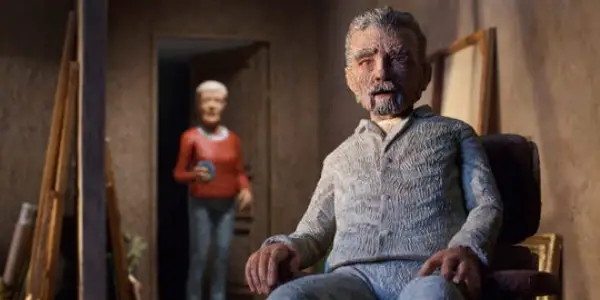
Sometimes the biggest impacts come in the smallest of packages. With this year’s animated shorts, Mémorable, from writer and director Bruno Collet, becomes an instant front runner with its heart wrenching depiction of Alzheimer’s, coupled with the true depths of love and devotion. There is a raw depiction of the disease, the hard-lines off ailment depicted in the story, the wrinkles of the man’s face and the paint that smears the lines of clarity and confusion.
Utilizing a mixture of puppetry and 3D computer generated effects, this is literally one of the most memorable short films regarding Alzheimer’s. There is an instant call back to Late Afternoon, 2019’s Oscar nominated animated short, whose subject matter also skillfully depicted the disease through the art of animation. Yet where Late Afternoon was about the memories fleeting, lost in a sea of absence and time, Mémorable focuses on the losing of memory, the absence of markers in time, where the patient is frozen in place while time moves on without him.
Yet, where there is despair and sadness, there is also hope and true warmth that resonates. While the man may be loosing his grip on the world and those around him, ever present is the love of his wife. No matter how devastating the outcome or frustrating the experience, she stays by his side – the true example of the love for another individual. Even when his memory has completely left him, his memory of the woman in front of him gone, a stranger in her place, she stands by him, lending what she can to make him more comfortable – to make him happy.
Mémorable only further elevates and drives home its themes and storyline through the impeccable attention to detail. As time passes within such a constrained medium, it is the details that bring a true understanding to fruition. The sea of post-it notes, the dead fish symbols, the increase of wrinkles, each element reflecting the digression of the mind and the passing of time fluidly and elegantly. They are the metronome for the short whose speed of passing is as rapid as the man who no longer remembers them.
Sister (Siqi Song)
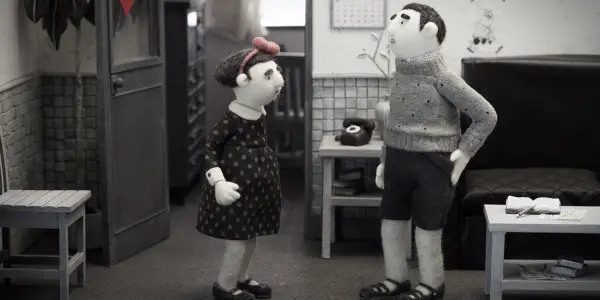
As each of the animated shorts tackled a variety of relationships, I was unprepared for the power of Sister and the political prowess it was able to yield. As Sister, from director and writer Siqi Song, begins, a young boy discussing his relationship with his sister, viewers will find themselves unsure of the direction of the short, what makes it stand out from examinations of brothers and sisters that have come before.
As the child speaks of his relationship with his sister, there is an instant relate ability as I find myself comparing my childhood alongside my siblings. The way life changed when the sister was born, the fighting over the remote, the resistance to share what is taken away – it was all familiar.There is a wispy animation created by the felt like fibers of the figures, the loose strands almost dreamy and surreal. It furthers the relatability, almost as if it was a memory in my own mind. As you settle into this environment the filmmakers have created, it is ripped away from you, the stage set and the checkmate delivered. The sister never existed.
The young boy never had the chance to experience all the feelings that have just been reawaken within the film’s viewers. They never fought, his car was never taken and she never invaded his space. Rather, his parents had already had the government imposed limit of children allowed in China, his mother, like many throughout the country, forced to have an abortion.
Where each of the Oscar nominated animated short films before had examined relationships as they exist, shape and transform, Sister was the first that looked at a relationship that should have been and never was. With the government imposed restrictions, he and his family were robbed of the experiences many around the world had the ability to have – and can never attempt to recreate again.
Which animated short do you think will win? Let us know in the comments below!
Does content like this matter to you?
Become a Member and support film journalism. Unlock access to all of Film Inquiry`s great articles. Join a community of like-minded readers who are passionate about cinema - get access to our private members Network, give back to independent filmmakers, and more.













